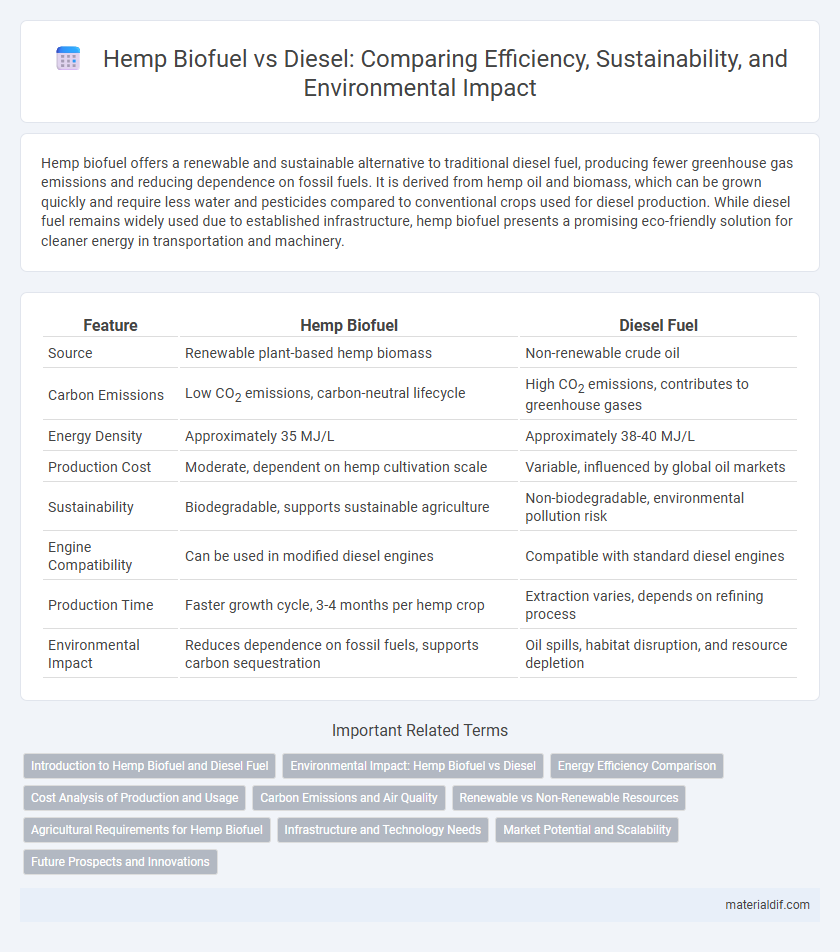Hemp biofuel offers a renewable and sustainable alternative to traditional diesel fuel, producing fewer greenhouse gas emissions and reducing dependence on fossil fuels. It is derived from hemp oil and biomass, which can be grown quickly and require less water and pesticides compared to conventional crops used for diesel production. While diesel fuel remains widely used due to established infrastructure, hemp biofuel presents a promising eco-friendly solution for cleaner energy in transportation and machinery.
Table of Comparison
| Feature | Hemp Biofuel | Diesel Fuel |
|---|---|---|
| Source | Renewable plant-based hemp biomass | Non-renewable crude oil |
| Carbon Emissions | Low CO2 emissions, carbon-neutral lifecycle | High CO2 emissions, contributes to greenhouse gases |
| Energy Density | Approximately 35 MJ/L | Approximately 38-40 MJ/L |
| Production Cost | Moderate, dependent on hemp cultivation scale | Variable, influenced by global oil markets |
| Sustainability | Biodegradable, supports sustainable agriculture | Non-biodegradable, environmental pollution risk |
| Engine Compatibility | Can be used in modified diesel engines | Compatible with standard diesel engines |
| Production Time | Faster growth cycle, 3-4 months per hemp crop | Extraction varies, depends on refining process |
| Environmental Impact | Reduces dependence on fossil fuels, supports carbon sequestration | Oil spills, habitat disruption, and resource depletion |
Introduction to Hemp Biofuel and Diesel Fuel
Hemp biofuel is a renewable energy source derived from the oil extracted from hemp seeds and biomass, offering a sustainable alternative to conventional diesel fuel. Diesel fuel, produced from crude oil through refining, remains the dominant fossil fuel for transportation and heavy machinery due to its high energy density and established infrastructure. The environmental benefits of hemp biofuel include lower carbon emissions and biodegradability, positioning it as a promising candidate in reducing reliance on non-renewable diesel fuels.
Environmental Impact: Hemp Biofuel vs Diesel
Hemp biofuel produces significantly lower greenhouse gas emissions compared to diesel fuel, reducing carbon dioxide and particulate matter released into the atmosphere. Cultivating hemp for biofuel also enhances soil health through phytoremediation and requires fewer pesticides and fertilizers than conventional diesel feedstock crops. The biodegradability and renewable nature of hemp biofuel contribute to minimizing environmental pollution and dependence on fossil fuels.
Energy Efficiency Comparison
Hemp biofuel offers a renewable alternative to diesel fuel, producing approximately 80% of the energy output per gallon compared to diesel, with a lower carbon footprint. Diesel engines running on hemp biodiesel demonstrate comparable torque and horsepower, though hemp biofuel tends to have a higher cetane number, enhancing combustion efficiency. Lifecycle analyses indicate hemp biofuel reduces greenhouse gas emissions by up to 60% relative to conventional diesel, making it a more sustainable choice for energy efficiency in transportation.
Cost Analysis of Production and Usage
Hemp biofuel production involves lower raw material costs due to hemp's rapid growth and minimal fertilizer requirements, compared to diesel fuel derived from fossil fuels with fluctuating extraction expenses. Processing hemp into biodiesel typically demands less energy, reducing overall production costs and contributing to a more sustainable lifecycle. Usage of hemp biofuel offers competitive pricing in the long term, as it benefits from renewable feedstock and potential tax incentives, making it economically viable against the volatile diesel market.
Carbon Emissions and Air Quality
Hemp biofuel significantly reduces carbon emissions compared to diesel fuel due to its renewable nature and carbon-neutral lifecycle. Combustion of hemp-derived biofuel emits fewer pollutants like sulfur oxides (SOx) and nitrogen oxides (NOx), improving air quality and reducing smog formation. Using hemp biofuel supports lower greenhouse gas emissions, making it a cleaner alternative that mitigates climate change impacts associated with conventional diesel.
Renewable vs Non-Renewable Resources
Hemp biofuel is derived from renewable plant biomass, making it a sustainable energy source that reduces dependence on finite fossil fuels like diesel. Diesel fuel is a non-renewable resource extracted from crude oil, contributing to greenhouse gas emissions and environmental pollution. Utilizing hemp biofuel promotes carbon neutrality and supports a circular economy by leveraging rapidly renewable agricultural inputs.
Agricultural Requirements for Hemp Biofuel
Hemp biofuel offers a sustainable alternative to diesel fuel, requiring significantly less water and pesticides compared to traditional crops like corn and soy used for biofuel production. It thrives in diverse soil types with minimal nutrient input, reducing the need for synthetic fertilizers and promoting soil health through crop rotation. Efficient hemp cultivation for biofuel also demands moderate climatic conditions and can be harvested multiple times per growing season, enhancing biomass yield and energy output.
Infrastructure and Technology Needs
Hemp biofuel requires specialized infrastructure for processing biomass into ethanol or biodiesel, including advanced extraction and fermentation equipment not widely available in traditional fuel facilities. Diesel fuel benefits from an established global distribution network, fueling stations, and engine compatibility, whereas hemp biofuel demands modifications in storage and engine design to accommodate its chemical properties. Investment in research and development is crucial to optimize hemp biofuel production technology and retrofit existing infrastructure to enable large-scale adoption.
Market Potential and Scalability
Hemp biofuel offers significant market potential due to its renewable nature and lower carbon emissions compared to traditional diesel fuel, appealing to environmentally conscious consumers and governments. The scalability of hemp biofuel depends on advancements in cultivation techniques and processing technologies that can increase yield and reduce production costs. Growing demand for sustainable energy solutions positions hemp biofuel as a promising alternative in regions with favorable agricultural conditions and supportive regulatory frameworks.
Future Prospects and Innovations
Hemp biofuel offers a sustainable alternative to diesel fuel through its high biomass yield and low environmental impact, presenting promising future prospects in the renewable energy sector. Innovations in enzymatic hydrolysis and transesterification processes are enhancing the efficiency of hemp-derived biodiesel, increasing its competitiveness with traditional diesel. Research into genetically engineered hemp strains aims to boost oil content and resilience, further driving the potential for large-scale commercial biofuel production.
Hemp Biofuel vs Diesel Fuel Infographic

 materialdif.com
materialdif.com